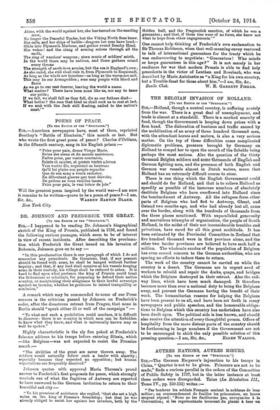THE BELGIAN INVASION OF HOLLAND.
[To THE EDITOR OF THE "SPECTATOR."-] SIR,—Holland, though a neutral country, is suffering acutely from the war. There is a great deal of unemployment, and trade is almost at a standstill. There is a marked scarcity of food, though the Government is keeping down prices with a firm hand. The dislocation of business and traffic caused by the mobilization of an army of three hundred thousand men, with the attendant horses and motors, is also a very serious matter. On the top of these difficulties come complicated diplomatic problems, pressure brought by Germany on Holland to compel her to open the month of the Schelde being perhaps the most serious. Also the question of the thirty thousand Belgian soldiers and some thousands of English and German fighting men, and the presence of both English and German war vessels almost in Dutch waters, mean that Holland has an extremely difficult course to steer.
There is one thing which the English Government could and should do for Holland, and that is to relieve Holland as speedily as possible of the immense numbers of absolutely destitute Belgians who have overflowed into Holland since the bombardment of Antwerp. All the refugees from other parte of Belgium who had fled to Antwerp, Ghent, and Ostend two months ago, and who had already lost all, came over the border, along with the hundreds of thousands from the three places mentioned. With unparalleled generosity and marvellous triumphs of organization, the people of South Holland, in the midst of their not inconsiderable troubles and privations, have cared for all this great multitude. It has been estimated by the Provincial Committee in Zeeland that five hundred thousand were in that province alone, and the other two border provinces are believed to have each half a million. The wholesale exodus of the population of Belgium has even caused concern to the German authorities, who are sparing no efforts to induce them to return.
The work of the country cannot be carried on while the country is a desert. The Germans are in urgent need of workers to rebuild and repair the docks, quays, and bridges which the Belgians destroyed in their retreat. Also the rail- way lines, which have been much damaged. It therefore becomes more than ever a national duty to bring the Belgians away, and prevent the Germans having the benefit of their work. The humanitarian reasons for helping the Belgians have been present to us all, and have been set forth in many newspapers and public speeches, and the honourable obliga- tions to Belgium which this country has undertaken have also been dwelt upon. The political side is less known, and should also receive the attention of every thoughtful person. Offers of hospitality from the more distant parts of the country should be forthcoming in large numbers if the Government are not to be encouraged to shirk the only possible solution of this pressing question.—I am, Sir, &c., ELLEN WaLsii E.


































 Previous page
Previous page